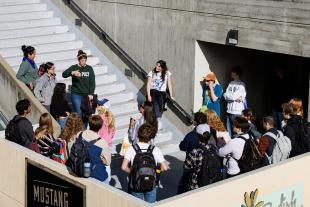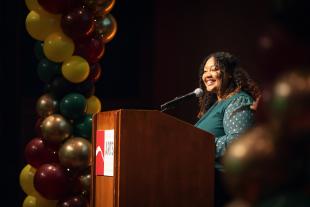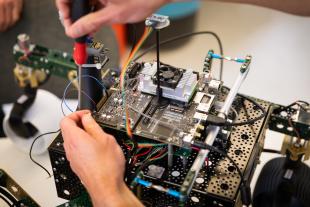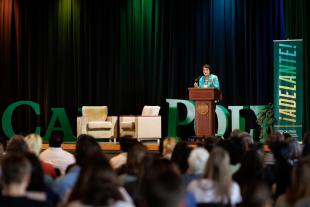'History is Made By Ordinary People.' Activist Angela Davis Headlines Change the Status Quo Conference
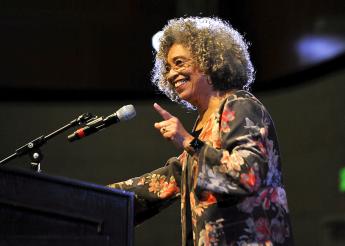
Political and social activist, author, educator and National Women’s Hall of Fame honoree Angela Davis launched the 18th annual Change the Status Quo Social Justice Leadership Conference Feb. 29 with a passionate message to work collectively to create more equitable and just institutions for all.
More than 700 people from the Cal Poly community and broader region came to hear Davis talk at the morning keynote. Many continued their day in numerous workshops and sessions designed to empower attendees to challenge social norms, ask critical questions, demand solutions and make lasting social change.
“You know, history is made by ordinary people,” Davis said. “When ordinary people join together to create movements, they make change happen. We join social movements in order to transform our relatively powerless individual selves into a great collective self.”
So many struggles in the U.S. are intertwined, Davis said, including struggles against climate change, to defend the human rights of immigrants, and against racist violence and gender violence. She urged the crowd to think of the intersectionality of these struggles.
“Injustice everywhere is a threat to justice everywhere,” Davis said, quoting Martin Luther King Jr. “That is a lesson that should be learned by those who hold political power in this country today, because often they assume that in order to satisfy one group, another group has to be attacked or scapegoated.”
Noting that Feb. 29 was the last day of Black History Month, Davis said the U.S. has only just begun the process to address the extent to which the country’s social, economic and political institutions have been deeply infected with racism.
“Diversity and inclusion without justice, without transformation, can leave the racist, misogynist structures intact,” she said. “To work against racism also entails working against heteropatriarchy, working against ableism, homophobia and a range of other social injustices.”
Davis urged attendees to vote and stressed the importance of engaging in community activities like advocating for racial and environmental justice and supporting labor struggles.
“We’re not so much voting for the person who will lead us to the mountaintop, but the person who will give us more space to engage in the efforts and movements that are really responsible for historical change,” Davis said.
There is amazing activism happening throughout the country right now, Davis added.
“I try not to think in terms of years or what is happening now but in terms of much longer periods of time — what will be the meaning of this present moment 100 years from now, or 500 years from now,” she said.“There were people 200 years ago who were struggling in order for us to be able to do something like what we’re doing today.”

